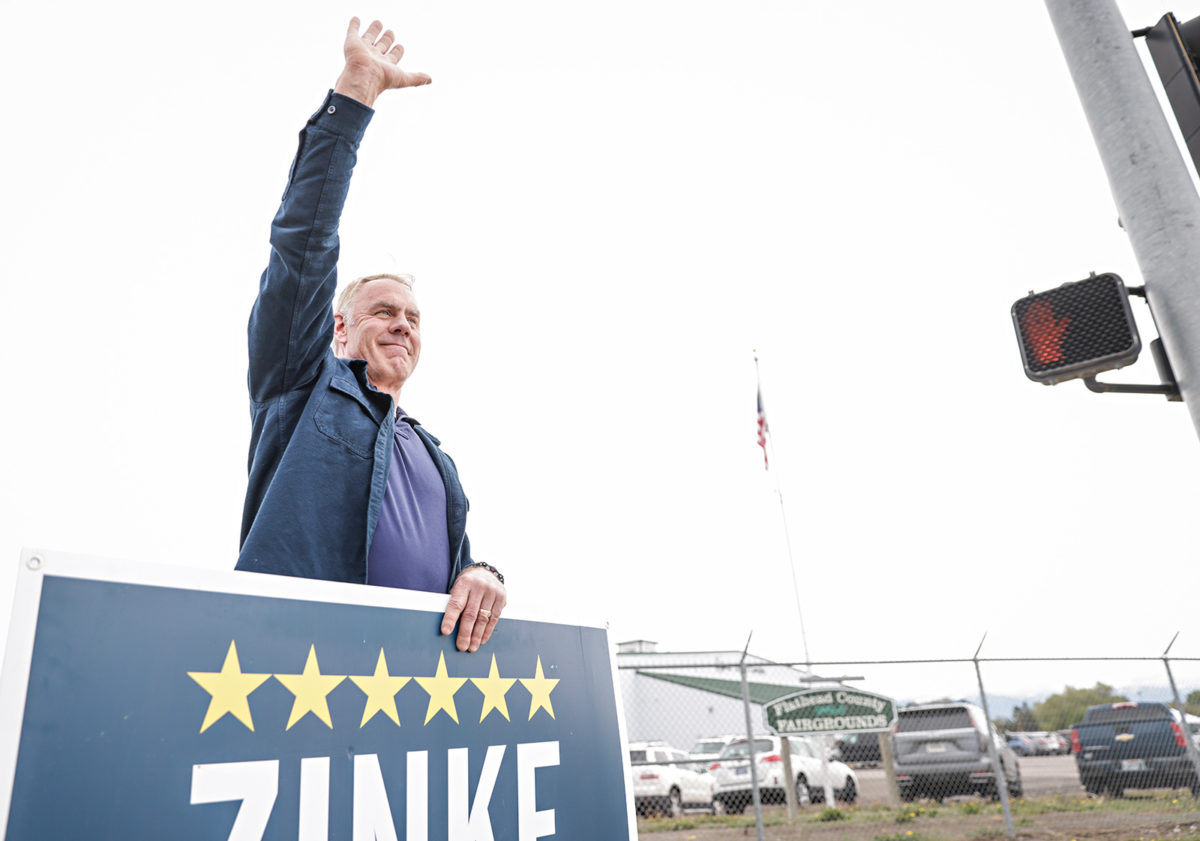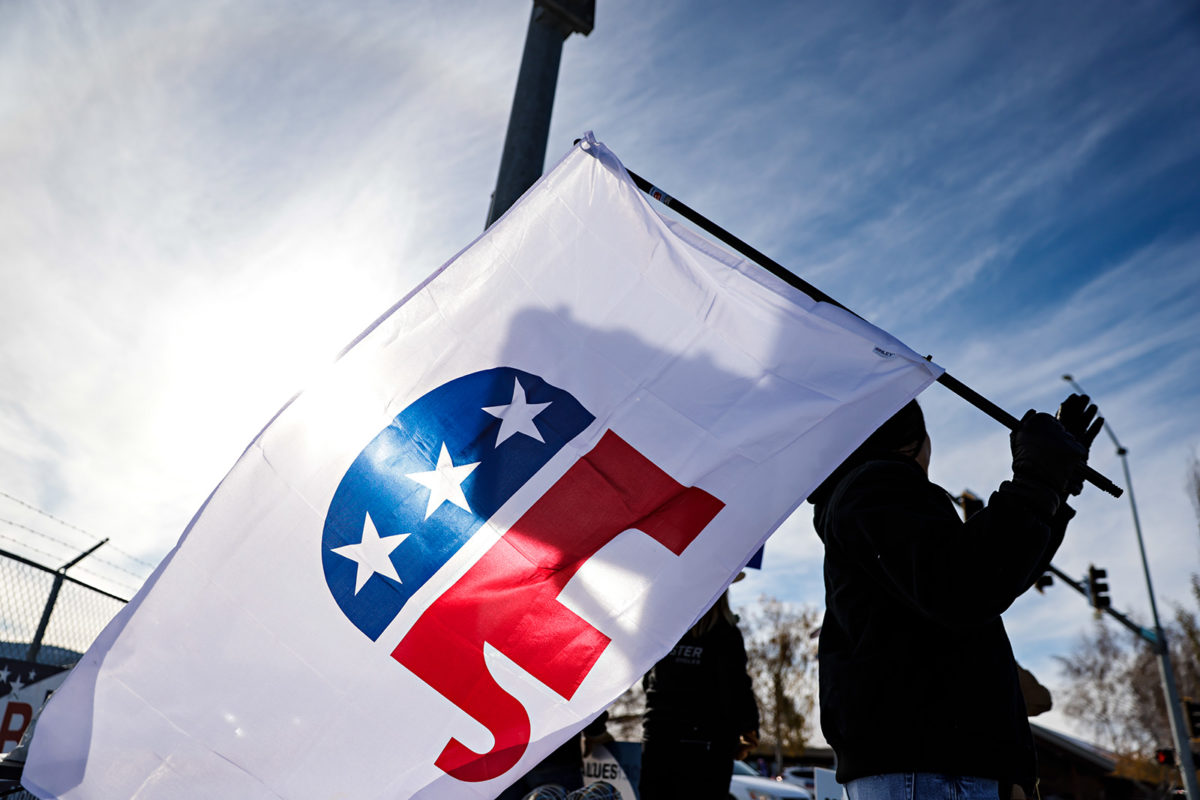The Party Faithful
Former Governor Marc Racicot stepped out of retirement to warn Montanans about threats to democracy. Now, the Republican Party he once knew is cutting ties with him.
By Denali Sagner
From where former Governor Marc Racicot sits on a sunny Wednesday afternoon at his home outside of Missoula, the world of Montana politics looks more unrecognizable than he ever could have imagined.
Racicot calls the current moment one “between the autumn and winter” of his life. At the age of 74, the former governor and his wife, Theresa, spend most of their time acting as parents to five adult children and grandparents to a plethora of grandchildren, who are now scattered across the Mountain West. Racicot admits, with a laugh, that the house is far too big for just him and Theresa, and would be better suited for a young family with a few horses. As the sun streamed through the windows of Racicot’s living room, the former governor recalled his extensive career in Republican politics, one that spanned the distance between Helena and Washington, D.C., and the time between the early Nixon years and the end of the second Bush administration.
It’s a career that, until recently, Racicot assumed had faded from the limelight.
Yet, Marc Racicot’s name reemerged on the political landscape when the Montana Republican State Central Committee on Feb. 16 approved a resolution officially rebuking Racicot for “action to damage, undercut, and defeat the efforts of the elected officials of the MTGOP and the Republican Party in general.” The resolution, which condemned Racicot for his endorsements of Democrat Monica Tranel in the 2022 House Congressional race, Ingrid Gustafson in the 2022 Montana Supreme Court race, Joe Biden in the 2020 Presidential race, and Justice Ketanji Brown Jackson in her nomination to the United States Supreme Court, asserted that Racicot “is not considered by the MTGOP to be a Republican” and “does not have the support” of the party. Don “K” Kaltschmidt, chairman of the Montana Republican Party and a prominent Flathead Valley car dealership owner, signed the letter on behalf of the party.
“We notify all Republican Central Committees and Republicans statewide to recognize the potential irreparable harm actions taken by this high-profile individual may have done or may do in the future to the State of Montana, its citizens, and the Republican Party,” the letter stated.

The committee’s condemnation of Racicot arrived shortly after a delegation of Republican lawmakers from Flathead County reprimanded two freshmen legislators for supporting a rules package in the state House of Representatives that would “reduce power” of the Republican supermajority “in the name of being ‘fair’ to our minority colleagues,” according to a letter from the delegation.
The excommunication of Racicot came as a surprise not only to the former governor, but to those who remember Racicot as a fiscal conservative, a staunch ally of George W. Bush and an advocate for deregulation and business interests. For many who lived through Racicot’s involvement in the 2000 Florida election recount, as well as his tenure as Montana Governor and chairman of the Republican National Committee, the notion that the politician “is not considered … to be a Republican” signaled a startling assertion by the Montana GOP, a party that appears to be increasingly at odds with itself as party leaders appear eager to erase the waning remnants of its strong bipartisan history — one that was etched over decades by figures like Racicot himself. In the wake of the censure, Racicot looked back at the political career that built him, and ahead toward the murky future of the party to which he once belonged.
After graduating from Carroll College in 1970 and the University of Montana Law School in 1973, Racicot entered the Judge Advocate General’s Corps of the United States Army, where he was stationed as a prosecutor in West Germany. Racicot was discharged from the Army as a captain in 1976, after which he returned to Montana to serve first as a deputy county attorney for Missoula County, and then a special prosecutor for the state.
Then, the former governor remembered with a laugh, he lost three consecutive elections — first for chief justice of the Montana Supreme Court, then twice for district judge in Lewis and Clark and Broadwater counties.
“I lost all three times,” Racicot said. “When I look back, I realized, probably for good reasons.”
In 1988, Racicot ran for Attorney General of Montana, defeating Democrat Mike McGrath. He served in the office until 1993, when he won the Governor’s race against Democratic State Representative Dorothy Bradley by a margin of less than 11,000 votes.
“I was elected barely. I had an incredibly competent candidate on the Democratic side,” Racicot said. “She was much the same, a little bit of a maverick. We kind of occupied the center of the political spectrum. She was a little bit center left, I was a little bit center right. And, frankly, that’s where most people were.”
Racicot was reelected by a historic margin in 1996, winning every county in the state of Montana. Democratic State Senator Chet Blaylock, Racicot’s original opponent in the race, died unexpectedly weeks before the election, prompting a contest between Racicot and Lieutenant Governor candidate Judy Jacobson, who appeared on the ballot as candidate for both Governor and Lieutenant Governor, confusing many voters.

Racicot governed the state largely from the center-right during his tenure, pushing education and welfare reform, tax cuts and infrastructure developments.
Under his governorship, the state eliminated a $200 million deficit in 1993 and produced a $22.4 million budget surplus in 1995, which was doled out to Montanans in the form of tax refunds. Racicot was fiscally conservative and pedantic, forcing department heads to defend their budgets on a line-by-line basis, and frequently limiting their spending. He cut the size of the state government, eliminating two executive departments and reducing the staff of his own office to about half of its 1977 size.
The governor invested over $500 million in increasing the number of prison beds in the state, and funneled more than $2.5 billion of state and federal funding into bridges and highways.
Racicot held a 79% positive job-approval rating halfway through his first term in December 1994, according to a Lee Newspapers poll, and an 85% approval rating in December 1998.
Yet the Governor was not immune from criticism, especially from environmental and workers groups.
Racicot opposed an initiative to ban a cyanide heap-leaching process used by gold mines, one that was widely supported by Montanans. The governor signed legislation that weakened Montana’s water-quality standards, and agencies in his administration were slow to enforce environmental regulations, moves that were part of what many environmentalists described as the governor’s habitual coziness with extractive industries.
The governor also faced pushback when the state turned over management of its mental health facility to an out-of-state company to the tune of a $400 million contract, a partnership that failed less than a year after it began, as treatment and administration protocols fell apart. While the company eventually canceled the contract, critics assailed the governor for holding on to it for too long, and eventually running a deficit on its operation costs. Others challenged the legitimacy of the governor’s successes in cutting welfare rolls, questioning whether the people who were taken off of state benefits were truly better off, or were just living without needed support.

And, most notably, Racicot left office under the specter of the deregulation of the Montana Power Company, the state’s major utility supplier. The policy decision allowed for the sale of Montana’s power assets to out-of-state investors, pushed electricity prices to unseen levels, and led to devastating layoffs and pension losses for Montana workers.
After leaving the executive office in 2001, the Racicot family moved to Washington, D.C., where the former governor served as the chairman of the Republican National Committee (he was appointed by President Bush, a close friend) before becoming chairman of Bush’s re-election campaign from 2003 to 2004, and then an attorney and lobbyist for various interest groups in the private sector.
By the end of the Bush era, nearly a decade in Washington had passed, and Racicot decided it was time to return home to Montana, where he and Theresa could finish raising their family. With a long career of politics behind him, the quiet of life in northwest Montana was welcome.
Yet as he began to settle into a life away from government, Racicot said that signs of political unrest had begun to percolate, both in Helena and Washington — signs that grew increasingly alarming for the retired politician.
Bipartisanship stood out as a core theme in Racicot’s remembrance of his own career, a value he said was forged during his time in the National Governors Association (NGA). Racicot said NGA meetings served as a productive forum for Democrats and Republicans to work together on issues ranging from infrastructure to Medicaid to education reform.
“There’s nothing like being able to come in with disparate notions and end up with a solution,” Racicot said. “There was just no presumption that others were trying to get over on you, or that they were out for themselves, or any of those things.”
The former governor described working with politicians from differing states, including Democratic President Bill Clinton.
“Clinton didn’t have really a problem with the governors across the country, Republican or Democrat,” Racicot said. “He knew policy inside and out. He loved it. He would sit and discuss how to solve issues with us deep into the night, way past when he was supposed to terminate the conversations. We had a table, 50 people around it, and there was just no partisan bickering. He wanted to do big things, and we all wanted to do big things.”

As the Obama years wound to a close, Racicot said he watched from northwest Montana as both Congress and the Montana Legislature became more combative, and his memories of working across the table felt more and more like a distant and unreachable dream.
“The communications were different. They were abrupt, they were edgy, they were angry,” the former governor said. “People were much more willing to engage in combat when they didn’t have to look in another person’s eyes.”
Racicot attributes the fraying of the bipartisan fabric to the rise of the internet and uncontrolled campaign spending. He noted specifically the 2010 Supreme Court Decision Citizens United v. Federal Election Commission, which allowed for unlimited campaign expenditures by corporations under the free speech clause of the First Amendment. While legislators previously spent the majority of their time face-to-face with one another, tackling complex issues across the table, the explosion of telecommunications and campaign fundraising made it such that legislators were spending less time together and more time returning to their home districts to fundraise for their next election, he said.
In 1992, a total of $2.6 million was spent on the race between Democrat Pat Williams and Republican Ron Marlenee for Montana’s at-large House district. Comparatively, Montana’s 2020 House race, which was won by Rep. Matt Rosendale, garnered over $11 million in campaign finance donations.
“Now we have all these third-party groups and the fundraising is obscene,” Racicot said. “That’s one of the culprits here in this story, and the internet is the other one.”
By the time Donald Trump began his candidacy for President, Racicot’s fears about the deterioration of American politics had begun to take an ominous shape. Racicot recalled his concerns over Trump’s extremism, reliance on divisive rhetoric, and lack of concern for statesmanship and diplomacy. In 2016, Racicot, for the first time since his move back to Montana, stepped again into the political spotlight.
In July 2016, Racicot wrote an opinion piece for the Washington Post, in which he declared he would not endorse Donald Trump and encouraged Americans to reject his candidacy.

“Trump has demonstrated neither the aforementioned qualities of principled leadership, nor offered any substantive or serious conservative policy proposals consistent with historical Republican Party platform positions. Both, in my humble view, are indispensable preconditions to his selection as the Republican candidate for the office of president of the United States,” Racicot wrote.
He later spoke at a meeting of Montana legislators — Democratic and Republican — and urged them that the country could do better than capitulate to what he saw as the divisive politics espoused by the Trump candidacy.
A few months later, Trump won Montana in the 2016 general election with 55.6% of the vote to Hillary Clinton’s 35.4%.
Speaking about Trump’s campaign strategy, Racicot said, “You appeal to the small side of our nature. You try to triangulate that and leverage it, one group against another group. You present your role as the savior, and you keep up a steady stream of critique and anxiety. And now, you could do that exponentially more effectively, because you could do it constantly, ubiquitously with the internet.”
After Trump carried the state in 2016, Montanans would vote to reelect him in 2020 by an even larger margin, and they would bring about the victories of a number of other Republicans, including Gov. Greg Gianforte, U.S. Sen. Steve Daines and U.S. Rep. Matt Rosendale. In 2022, Montana voters would add U.S. Rep. Ryan Zinke to the state’s Republican Congressional delegation, and would send a bicameral supermajority of Republicans to Helena for the first time since 1972.
This past fall, Racicot once again offered endorsements for candidates running against those backed by the Montana GOP, endorsements that would ultimately lead to his recent censure.
Racicot refused to back Republican Rep. Ryan Zinke in the race for Montana’s western Congressional district due to Zinke’s close ties to Donald Trump.
“He wanted me to support him and I told him no,” Racicot said, remembering an early conversation with the Congressman.
“I said, ‘As long as you are an acolyte of Donald Trump’s, who I think is a scourge on America, and if he ever has the opportunity to serve again, it’ll be a horrible fate for this country. You enable him. You’re jointly backing each other right now, and if you’re going to be in that position, I’m not going to be a supporter.’”

Racicot endorsed Democratic candidate Monica Tranel.
“I don’t agree with Monica about everything,” Racicot said. “But she’s a very good lawyer. She works very, very hard. She’s honest. Her integrity is unquestionable, in my view.”
Racicot also endorsed Montana Supreme Court Justice Ingrid Gustafson against Republican-backed candidate James Brown, in a race for a historically non-political position that had become charged with partisan politics.
“You had a Republican Governor soliciting a presently existing Republican official to run for the Supreme Court,” Racicot said. “I didn’t know Justice Gustafson personally at all, but I knew her record. I read her opinions and I knew what kind of judge she was. I thought, this is out of bounds, totally out of bounds.”
On Feb. 16, a rebuke of Racicot would arrive in his inbox, with his endorsements of Tranel and Gustafson laid out on the page.
Racicot said the consolidation of Republican power, as well as the legacy of Trump-era conservatism, has spawned rhetoric and policy proposals that run against his values as a lifelong conservative, and that threaten the tenuous balance of powers outlined in the Montana Constitution.
In the 2023 legislative session, Republican lawmakers requested drafts for 46 amendments to the state Constitution — a considerable increase from the 18 amendments requested in 2021, and the 14 requested in 2019. Recent bills proposed by Republicans in Helena have sought to shrink the size of the Montana Supreme Court, allow Montanans to form citizen grand juries via petition and force prosecutors to carry out indictments, and allow the legislature to appoint district judges and state Supreme Court justices, instead of the system of judicial elections.
For Racicot, bills that target the state Constitution and the proceedings of the judiciary mark the most acute threat to democracy, and show a lack of care for the Constitution stemming from a desire to consolidate power at all costs. He spoke of the long process of drafting the state Constitution in 1972, one that required the cooperation of 100 disparate elected officials and the popular approval of voters.
“It’s an extraordinary accomplishment to get 100 different people — 56 Democrats, 38 Republicans, and six independents — to sit down for 6 to 8 weeks, focused upon the public good, and to bring together a document that provides an institutional framework that’s eternal, if you treat it that way,” Racicot said.

“If you’re a conservative, really a conservative, you don’t try to disembowel the Constitution. You conserve it,” he added. “I don’t have trouble with conservative measures that respect the separation of powers. But to me, it’s everything from arrogance to ignorance that would support bills that would invade the Constitution and another branch of government. Doing it tears the system apart, and it won’t function.”
While the rebuke of the high-profile former governor made recent headlines, the condemnation of Montana Republicans who deviate from the party has not been limited to Racicot.
The Flathead County Republican Caucus on Feb. 14 released a letter denouncing Rep. Courtenay Sprunger, R-Kalispell, and Rep. Tony Brockman, R-Kalispell, for supporting House Resolution 1, a rules package that made it easier for legislators to pull tabled bills out of committee and put them back onto the floor for debate. The letter, signed by eight legislators from the Flathead Valley, charged that Sprunger and Brockman “lack the same ideology” as the rest of the party, and lamented that “two of our local legislators have created a divide in our party to reduce the power of our supermajority and in turn, help the Democrat party.”
In a response letter, Rep. Brockman wrote that he disagreed “with consolidating power” and said that “our Constitution established a Representative Democracy, enshrining the idea that power should rest in the hands of the people.”
Rep. Sprunger wrote that she believed the rules package would make it easier to hear, and subsequently pass, a greater number of Republican-backed bills, and cautioned against consolidation of power.
“Frankly, it would have been easier to opt for a vote that would lean toward consolidating power,” she wrote. “As a Representative Republic, I believe we are always wise to keep power in the hands of the people. To compromise this belief because we have a supermajority or a certain leader in power would be to embrace situational ethics and that is simply not something I can justify.”

The deviation of Brockman and Sprunger prompted a sharp rebuttal from their party, one that lambasted policy decisions that would weaken the Republican stronghold over the state and echoed the censure of Racicot for stepping beyond the bounds of the party.
Al Olszewski, chairman of the Flathead County Republican Party, condemned the decision by the legislators, who he said “voted to change and weaken the supermajority.”
Regarding the rebuke of the former governor, Olszewski told the Beacon that Racicot, as well as former Republican Montana Secretary of State Bob Brown, who broke with the party in 2016, “leverage their position as a Republican senior elite” and “are not participating in the party to make it better.”
For Racicot, the desire to consolidate power and oust dissenting voices exists in the shadow of Trumpian conservatism, a form of politics that would have been unheard of during his governorship.
“They just keep ramping up the expectations and ramping up the amount of oppressive legislation and ramping up their efforts to control,” he said, discussing the current legislature. “I would think that you’d want to elongate your opportunity to serve by working with people that at some point in time, you’re going to have to work with to get along. That’s how the old Legislature used to work.”
“I actually think I’m being more loyal to the party by trying to warn them, then by just letting it unfold and happen,” Racicot said, speaking about the extremism he sees gripping the GOP. “They don’t see it that way.”
Many Republican legislators in Montana have aligned themselves with the former President, who is now preparing for a 2024 presidential campaign amid an array of federal and state investigations into his personal finances, handling of classified documents and his role in the Jan. 6, 2021, insurrection at the U.S. Capitol. After Trump lost to President Joe Biden in 2020, U.S. Rep. Ryan Zinke raised questions about the legitimacy of the election, and U.S. Rep. Matt Rosendale fully denied its results. U.S. Sen. Steve Daines called into question the integrity of the election, but did not go so far as to deny its legitimacy.
While Racicot believes Trump’s power is waning, his fears remain about extremism, and its consequences for effective governance. He has spent the past few months following legislative efforts to change the state Constitution, which he calls “corrosive to democracy,” and following legislative bill hearings on occasion. Mainly, he is focused on trying to “persuade people that there’s a better way.”

“How do we treat each other? How hard do we try to take care of each other? How hard do we try to help others get to a point that we think is important, while they help us to do the same?” he said. “Those are all virtues of the Constitution that the framers made very plain were critical to providing the adhesive glue to the democracy. They can ignore it, or refuse to abide by that code of conduct, but if they do, I think their reign will be short lived.”
As the sun began to dip below the Rattlesnake Mountains, Racicot pondered the future. He recalled a 2022 report by The COVID States Project that found nearly 1 in 4 Americans think it’s sometimes justified to use violence against the government.
“As if the government wasn’t theirs. Who do you think the government is?” he asked.
He offered a hope that extremism will moderate before the threats to democracy become insurmountable, a hope that has become the foundation of the end of his career.
“The country’s changed,” he says. “Montana’s changed. They’ve changed.”